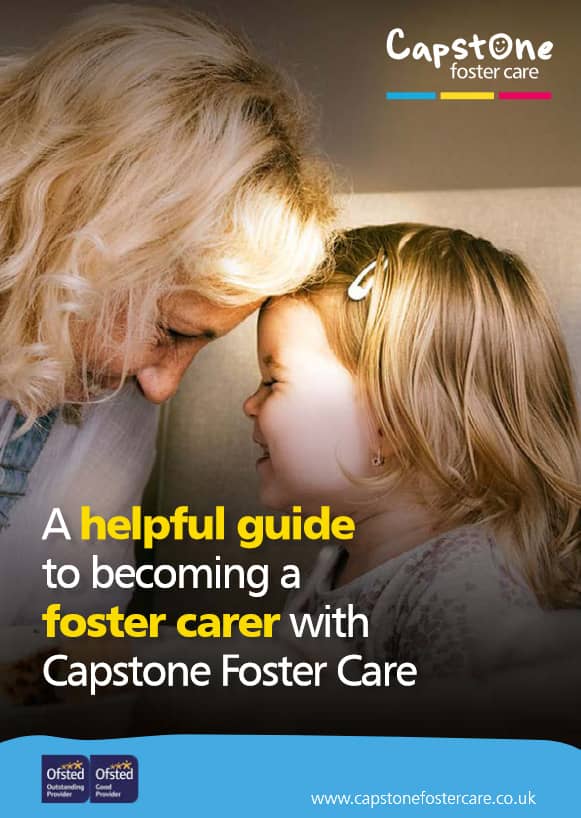


Fostering a disabled child
The role of an independent fostering agency
How to choose a foster care agency
Can I choose who I foster?
What are the benefits of fostering with an independent fostering agency?
What happens when a child is taken into care?
Fostering process: what happens on an initial home visit?
Fostering with local authority vs independent agency
A complete guide to becoming a foster carer
How Are Children in Foster Care Matched with Carers?
Foster Care Budgeting Tips
Becoming A Foster Carer
What is a Care Leaver?
What is a Foster Carer?
Fostering Regulations
How long does it take to become a Foster Carer?
What are the Foster Care requirements?
Changing IFA - Transferring to Capstone
8 reasons why a child may be taken into care
Fostering as a Career
Can you foster if you smoke or vape?
A guide to fostering assessments
LGBTQ+ Fostering
Equality, Inclusion & Anti-discriminatory Practice in Foster Care
What can disqualify you from foster care?
Can you foster if you’re on benefits?
Top transferable job skills to become a foster carer
Fostering as a same sex couple
Fostering while renting
Can you foster if you have mental health issues?
Is there an age limit for fostering in the UK?
Do foster carers get a pension?
How to foster a child: A step by step guide
How do DBS Checks Work?
Can I foster if...?
Mythbusting the top 10 Foster Care Myths
Can I foster if I am disabled?
LGBT Fostering Mythbusting
Can I foster if I have pets?
Can I Foster A Child?
Can I Foster and Work?
Can you Foster with a Criminal Record
Can Single People Foster?
LGBT Family and Foster Care
Fostering across Cultures
Muslim Fostering
Christian Foster Care
Sikh Fostering
Empty Nest Syndrome and Foster Care
Can I Foster?
What is the difference between residential care and foster care?
Fostering Babies and Young Children
What is Kinship Care?
Fostering Babies - Myths
Focusing on Parent & Child Fostering
Fostering Siblings
Fostering Teenagers
Fostering Teenagers - Breaking down the Myths
Fostering Unaccompanied and Asylum Seeking Children
Mother and Baby Foster Placements
Private Fostering
How does therapeutic fostering work?
Young Children Fostering Placements
Difference between short and long-term fostering
Types of self-harm
A Guide to the Foster Care Handbook
Reunification and Birth Parents: A Guide for Foster Carers
What is an EHC Plan? A Guide for Foster Carers
How to prepare a child for becoming a care leaver
Children who foster: impact of fostering on birth children
Fostering LGBTQ+ Youth
How to prepare your home for a foster child
How to help a lonely child: A Guide for Foster Carers
What are the National Minimum Standards for Fostering Services?
10 tips for foster children's education
How to prepare your foster child for secondary school
Tips for coping when foster placements end
Tips for foster parents during Coronavirus
What happens if foster parents get divorced?
5 ways to manage Mother's Day with foster children
Tips for managing foster children's bedtime routines
How to handle foster child bullying
Fostering allowances and the gender pay gap
What discounts can foster carers get?
How to adopt from Foster Care
5 ways to manage Father's Day for children in foster care
8 most common fostering challenges
FosterTalk Membership with Capstone Foster Care
Supporting foster children's contact with birth families
A guide to independent fostering
Keeping Children Safe Online: A Guide For Foster Carers
Movies About Foster Care
Play-based learning strategies for foster carers
A Guide to the Staying Put Program
Why Foster Parent Wellbeing Matters
How to deal with empty nest syndrome
How to recognise signs of depression in foster children
Can you take a foster child on holiday?
Tips and advice on fostering with a disability
10 tips on connecting with your Foster Child
Fostering vs Adoption - What's the difference?
How Fostering can change a future
How to adopt from Foster Care
How to encourage children to read in Foster Care
How to prepare a Foster Child's bedroom
Reading and Storytelling with Babies and Young Children
Supporting Children's Learning
The 20 most recommended books Foster Carers and young people should read
Things you can do when your children leave home
The impact of early childhood traumas on adolescence and adulthood
Anxious Disorders in Foster Children
What is sexual abuse and sexual violence
Foster Child behaviour management strategies
Foster Parent Advice: What to expect in your first year of fostering
Capstone's twelve tips at Christmas
10 celebrities who grew up in Foster Care
Could Millenials be the solution to the Foster Care crisis?
Do you work in Emergency Services?
Form F Assessor and Assessment Training
Foster Care Fortnight
Improving Children's Welfare - Celebrating Universal Children's Day
New Year - New Career - Become a Foster Carer
Young People Charities
Whether you're considering becoming a foster carer for the first time, or are a seasoned foster parent you may still have some questions about fostering. Our guide is packed full of helpful information, tips and real-life examples to help you at every stage of the fostering journey. Some of the topics we'll explore include:
There could be a number of reasons why you might consider becoming a foster carer. You might be driven by a desire to make a difference and look for a way to make a positive impact when caring for a child or young person. Or, you may be influenced by the challenges and traumas many children in care have experienced.
If you’re thinking about becoming a foster carer, you may also have plenty of questions about how to get started and be unsure about whether or not you meet the requirements to become a foster carer, along with practical considerations in caring for your foster child’s needs.
The main criteria to become a foster carer is that you must be over the age of 21, have a spare bedroom, be in good health, be a full-time resident of the UK and have enough time to provide support to a child or young person.
You can become a foster carer regardless of your marital status, gender, sexual orientation or cultural background. And while checks will be made to ensure you are fit enough to look after your foster child, you can foster if you have disabilities or have experienced poor mental health and you can’t be too old to foster.
And, while your financial situation is considered in the approval process, you are still able to become a foster carer if you’re on universal credit or if you rent instead of own your home.
Want to find out more? Read more about the foster care requirements here.
The application process from when you apply to become a foster carer to becoming a foster carer usually takes between three and six months in total.
Find out more about the application process in our helpful guide.
While you can indicate a preference towards a preferred age or gender, ultimately, the needs of your foster child will come first.
For more information including what criteria is assessed when choosing where to place a foster child read our complete guide.
The simple answer is yes, you do get paid to foster. And, here at Capstone foster care, we’re able to provide you with competitive fostering rates, starting at £400 a week.
These are just some of the common questions, for more information check out our fostering FAQs.
As a foster carer at Capstone, there are various types of foster care that we provide to cater for the needs of children and young people, including our own specialist service, MATTs (Multidisciplinary Assessment Treatment and Therapy Service).
For more information on the different types of foster care you might want to consider, read our detailed guide.
When deciding on whether to become a foster carer, it’s important to evaluate whether you have the right skills to become a foster parent. While you don’t need to have formal qualifications to become a foster carer, the core skills and attributes you’ll need to have to become a foster carer include:
In addition to these soft skills, you’ll also have access to continuous training and development in order to give you the tools you need to become a foster carer. Our skills to foster training runs over two to three sessions and covers the following topics;
We also provide a number of training courses to improve your level of skills which covers common challenges of fostering as well as specialist training courses for children and young people with more complex needs.
Learn about the skills needed to foster and the training available to you as a foster parent.
Providing a safe and supportive home is at the core of every foster carer’s values. They should include both physical and emotional strategies in order to make your foster child feel at ease.
The environment you offer your foster child should be physically safe and secure. If you’re fostering a young child, you should make sure your home is childproofed and free from hazards. One of the fostering requirements to become a foster carer is to have a spare room, but it is important that your foster child feels at home in this space. Cosy and comfortable décor, with soft lighting, is a good way to give the impression of a safe environment. Or, if it’s more of a long-term placement, giving your foster child the opportunity to customise their room will make them feel more welcomed and valued.
The other side of providing a supportive home is through providing a safe place for your foster child mentally. One of the main ways of achieving this is by building trust with your foster child. Showing genuine care will build a sense of security and create a nurturing environment where your foster child feels safe expressing their emotions and experiences.
Preparing your home ready for your foster child to arrive? Read our guide now.
Building relationships can be a challenge for both foster parents and foster children. In order to create a supportive and nurturing environment building relationships is essential. Some strategies that can help foster carers and foster children cement their relationships include;
Adapting to a new foster home can be difficult for children to navigate. It can sometimes be a lonely time. For more information on how to help a lonely child, read our helpful guide.
Foster carers play a vital role in the education and development of their foster children. Some of the ways that you can provide support in the development of your foster child include;
Other ways that foster parents can support their foster child’s education and development includes fostering a love for reading. Read more about how to encourage children to read in foster care here. Or for more advice on supporting your foster child’s education and development read more here.
Dealing with transitions are a key part of being a foster carer. Your foster child will have experienced lots of transitions in their lives from transitioning into foster care, along with other milestones like starting school and making new friends. Your foster child could also experience other life experiences, for example if you as a foster parent split with your partner. And ultimately you and your foster child will likely need to deal with the foster placement coming to an end.
One of the most important ways you can help your foster child transition into foster care is by being open and honest with your foster child from the get-go. Explaining the transition and addressing any worries or concerns they might have will provide reassurance for your foster child.
It’s always important to, where possible, preserve the connections that your foster child has with their family and important people in their lives. Maintaining a level of connectivity can help to support your foster child’s sense of stability and security.
We spoke to one of our carers about how they helped their foster child transition into foster care “We keep spare plaques handy, so when a new child arrives, we put their names on their bedroom door”.
Supporting milestones and major events in your foster child’s life helps with their development and confidence. No matter what event is happening in their life, being present, open and honest, will help them feel supported.
For extra guidance on how to support different milestones such as starting secondary school, read our guide here.
Similarly, to supporting your foster child through their significant milestones and changes in their life, you should be open and honest about any major changes that are happening in your life too.
If you experience any significant changes to your mental or physical health, relationship status or living arrangements, it will mean that you will need to be re-evaluated for your suitability as a foster carer. Our team will support you and your family and deal with any significant change as sensitively as possible while maintaining a focus on your foster child’s wellbeing.
For extra information on what to do as a foster carer if you go through a divorce or separation, read our guide.
While the well-being and happiness of your foster child are at the forefront of everything you do as a foster carer. It’s important to recognise the importance of self-care for foster carers.
Taking breaks for alone time can be beneficial to prevent burnout. It could be something as simple as taking time out of the week to read a book, watch your favourite TV show or practice a hobby.
You should also maintain your own social connections as well as use the support network available to you as and when you need it. Here at Capstone Foster Care, there’s a wealth of support available to you. From a dedicated social worker to a network of foster carers who have experienced the same scenarios as you have and are able to share insights, advice and support.
We also provide therapeutic training as part of MATTs which is an above-and-beyond training and personal development program devised to build skills in therapeutic care and is completely . These skills can be applied to your own self-care and wellbeing, as well as that of your foster child.
If you want to read more helpful advice visit our knowledge centre for the latest tips and guidance.
If you want to find out more about how becoming a foster parent has changed the lives of our carers and children. Here’s what Jenny had to say
“Originally we weren’t going to foster children long term, but after our first foster child’s time with us ended with a successful adoption, we were then matched with twins, who are under the age of 10 and were struggling to find a suitable home. Both children have Autism and it was a challenge to find them the right home. So we initially started with six weeks and said we would reassess after that, but after just six days they had our hearts and we knew we were keeping them.
“As both of the children had significant needs, it was at first a real challenge, but it has been lovely having them as part of the family, and every day we see a difference for the good in them. For them, it’s about having love, acceptance and clear boundaries and direction. What we have done with them isn’t magic, it’s parenting and it has been a complete pleasure having them in our lives.
“It’s really important that you have the right fit for you as a family. The therapeutic approach that Capstone Foster Care has, has really worked for us as a whole.
Don’t be put off by the negatives, because the positives certainly outweigh them.
Being able to make even the smallest bit of difference to a child’s life, and be part of their journey, whether it be a week, a month or even longer is a privilege and has certainly enhanced our family life as a whole.”
If you’re ready to become a foster carer, the first step is to enquire, simply fill in the contact form and one of our fostering advisors will be in touch within 24 hours.
If you’ve got any questions or would like to find out more about fostering with Capstone, fill out the form below.
An experienced fostering advisor from your local area will then be in touch.

Start the conversation today. Our team of friendly advisors are on hand to answer any foster care questions you may have. We can offer you honest and practical advice that can help you decide if becoming a foster carer is the right path for you.


